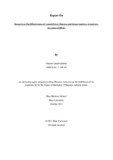| dc.contributor.advisor | Ahmed, Shamim | |
| dc.contributor.author | Maliha, Maisha Quadir | |
| dc.date.accessioned | 2023-05-15T06:49:04Z | |
| dc.date.available | 2023-05-15T06:49:04Z | |
| dc.date.copyright | 2021 | |
| dc.date.issued | 2021-10 | |
| dc.identifier.other | ID: 17104149 | |
| dc.identifier.uri | http://hdl.handle.net/10361/18289 | |
| dc.description | This internship report is submitted in partial fulfillment of the requirements for the degree of Bachelor of Business Administration, 2021. | en_US |
| dc.description | Cataloged from PDF version of internship report. | |
| dc.description | Includes bibliographical references (page 45). | |
| dc.description.abstract | From the inception of BRAC, its sole vision was to empower the poor communities of
Bangladesh through providing them with feasible and sustainable options of entrepreneurship
via microcredit loan financing and capacity building in these communities to self-sustain for
the long run. BRAC International has also similar goals as the visions aspired after here.
Overall, the missions and visions of BRAC worldwide lay at the core of a principle that is to
help the poor communities rise up the social ladder slowly, self-sustainably and all the while
realizing their potentials which can never go to waste if utilized proactively. BRAC realizes
that every individual has potential within and the organization takes it upon themselves to
move the poorest community otherwise termed as “Ultra Poor” to move beyond situations of
extreme poverty and get training from BRAC to become knowledgeable, self-dependent,
basic technical skills necessary to attain self-sufficient small businesses, and the most
important training as of yet is to impose leadership training and molding these individuals in
such a way so that they can further implement their skills and knowledge to improve the total
living standard of themselves, their children and all in all the entire community. The
Ultra-poor graduation program is such an intervention that gives these people the basic
introduction on how to combine livelihoods asset transfer and find access to financial
services, utilize the opportunities to entrepreneurial missions which will be sustainable in the
long run, helping them work on self-reliance and ultimately leading to a better future free
from the strikes of hunger and poverty. The programs are also designed in such a way as to
support continued access to capital generation via high amounts of asset transfer, developing
business insights as well as train them specifically on topics such as savings and easily
communicable financial basic knowledge. | en_US |
| dc.description.statementofresponsibility | Maisha Quadir Maliha | |
| dc.format.extent | 46 pages | |
| dc.language.iso | en | en_US |
| dc.publisher | Brac University | en_US |
| dc.rights | Brac University internship reports are protected by copyright. They may be viewed from this source for any purpose, but reproduction or distribution in any format is prohibited without written permission. | |
| dc.subject | Research | en_US |
| dc.subject | Content policy planning | en_US |
| dc.subject | Impact analysis | en_US |
| dc.subject | Brac | en_US |
| dc.subject.lcsh | BRAC (Organization) | |
| dc.title | Research on the effectiveness of content policy planning and impact analysis: A look into the center of brac | en_US |
| dc.type | Internship report | en_US |
| dc.contributor.department | Brac Business School, Brac University | |
| dc.description.degree | B. Business Administration | |

